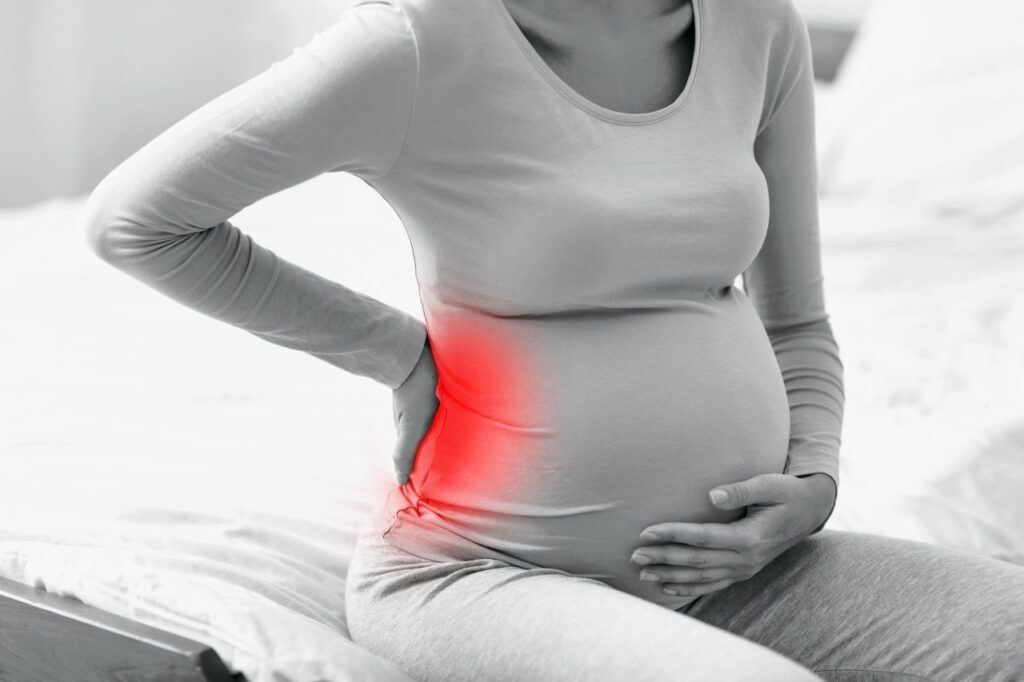Ever Tried Sleeping With a Bowling Ball on Your Belly?
That’s what late pregnancy can feel like — heavy, awkward, and uncomfortable in all the wrong ways. And one of the most common complaints that shows up along the way? Back pain. Sometimes it’s a dull ache. Sometimes it’s sharp, or it radiates down the leg. Sometimes it feels like your spine’s staging a rebellion.
Here’s the thing: pregnancy back pain is common, but it’s not always harmless. Knowing the difference between what’s “normal” discomfort and what might signal a deeper problem can bring real peace of mind. In this guide, we’ll break it down simply and safely — no scary stories, just facts, insight, and some gentle support.
✅ Key Takeaways
-
Mild to moderate back pain is normal, especially in the second and third trimesters.
-
Pain that’s sharp, constant, or comes with other symptoms (like fever or cramping) may not be normal.
-
Good posture, gentle exercise, and proper support can make a big difference.
-
If anything feels “off,” it’s always okay to call your provider — trust your gut.
Why Pregnancy Causes Back Pain in the First Place
You’re growing a human. That’s no small feat. And your body is shifting — literally.
🔄 Postural changes
As your belly expands, your center of gravity shifts forward. Your lower back curves more (called lordosis), which puts extra pressure on your spine and muscles. You might find yourself leaning back just to balance — and that strain adds up.
🧘♀️ Hormonal shifts
Pregnancy hormones, especially relaxin, loosen your ligaments and joints to prepare for birth. That’s great for delivery — but it means your joints, especially in your pelvis and lower back, are less stable during pregnancy.
🧱 Added weight
Let’s be honest — you’re carrying more weight now. That extra load puts stress on your back, hips, knees, and even your feet.
🛌 Sleep struggles
It’s harder to get good sleep, especially in the third trimester. The constant tossing, side-sleeping with pillows, and midnight bathroom runs can all worsen back pain.
What Kind of Back Pain Is Normal in Pregnancy?
Let’s start with the good news: most back pain during pregnancy is completely normal. It tends to show up around week 18 to 24 and may get more noticeable as your due date approaches.
🟢 Normal back pain feels like:
-
A dull, aching sensation in your lower back
-
Pain that worsens after standing or sitting for a while
-
Discomfort that improves with rest, stretching, or a warm bath
-
Tightness in your hips or buttocks (especially at night)
It’s often worst by the end of the day, and it may come and go depending on your activity, posture, and stress levels.
What’s NOT Normal: When to Worry About Back Pain
Sometimes, pain is your body’s way of waving a red flag. If your back pain is severe, persistent, or comes with other symptoms, it may need medical attention.
🔴 Watch out for these warning signs:
-
Sharp, stabbing, or constant back pain that doesn’t ease with rest
-
Pain accompanied by fever, chills, or burning when you pee (could indicate a kidney infection)
-
Back pain with uterine cramping, bleeding, or pressure (could be a sign of preterm labor)
-
Numbness or weakness in your legs (possible nerve compression)
-
Pain that radiates down one leg (sciatica — can be normal but should be evaluated)
If you’re ever in doubt, call your doctor or midwife. You’re not being dramatic — you’re being careful.
“When a pregnant woman says something doesn’t feel right, we listen,” says Dr. Maria Olson, OB-GYN. “She knows her body best.”
Common Types of Pregnancy Back Pain (and What They Mean)
1. Lumbar pain (lower back pain)
This is the most typical. It feels like a deep ache or tightness across your lower spine, usually from posture changes and muscle fatigue.
2. Posterior pelvic pain
This pain is deep in the buttocks, sometimes extending to the thighs. It’s often caused by joint instability near the sacroiliac joints (where the spine meets the pelvis).
3. Sciatica
If you feel sharp pain that travels down your leg, it could be the sciatic nerve being compressed. This can be caused by your growing uterus or baby’s position.
How to Relieve Pregnancy Back Pain Safely
You can’t hit up a deep-tissue massage or pop just any pill — but that doesn’t mean you’re helpless. Here are safe, effective options backed by experts.
🤸♀️ Move (gently)
-
Prenatal yoga, swimming, and walking are all fantastic.
-
Try pelvic tilts and cat-cow stretches to ease tension.
-
Always avoid exercises that strain your belly or back too much.
According to the American College of Obstetricians and Gynecologists (ACOG), physical activity during pregnancy can reduce back pain and improve overall well-being. [Source]
🛏 Support your body
-
Use a pregnancy pillow or wedge to support your belly and hips at night.
-
Place a pillow between your knees when side sleeping.
-
Consider a maternity support belt if you’re on your feet a lot.
🧍♀️ Fix your posture
-
Don’t slouch. Keep shoulders relaxed and your back straight.
-
Avoid standing for long periods.
-
Sit in chairs with good back support — and take breaks.
🧊 Use heat or cold (in moderation)
-
A warm (not hot) bath or a heating pad on low can help.
-
Cold compresses can reduce inflammation if you’re feeling sore.
👐 Try massage or bodywork
-
A prenatal massage by a certified therapist can work wonders.
-
Chiropractic care might help, too — just make sure your provider specializes in prenatal adjustments.
A 2018 review in The Journal of Clinical Chiropractic Pediatrics found that chiropractic care significantly reduced pregnancy-related back pain in most women. [Source]
Are Medications Safe for Pregnancy Back Pain?
It’s always best to talk to your provider before taking anything — even over-the-counter pain relievers.
-
Acetaminophen (Tylenol) is generally considered safe during pregnancy.
-
Ibuprofen (Advil, Motrin) and other NSAIDs are not recommended in the third trimester.
-
Avoid herbal or topical pain remedies unless approved by your doctor.
Back Pain in the Third Trimester: Normal or Labor?
In the final stretch, things can get confusing. Some women feel intense lower back pain before or during labor, especially with back labor (when the baby is facing the wrong way).
Ask yourself:
-
Is the pain coming in waves?
-
Does it feel like cramping or pressure in your pelvis?
-
Are you noticing tightening in your belly, like contractions?
If yes, call your provider. You may be in early labor — or your body might just be practicing (hello, Braxton Hicks).
Real Talk: You’re Not Weak for Feeling It
Back pain in pregnancy doesn’t mean you’re doing something wrong. It means your body is doing something huge. Growing a human is a full-body transformation — and sometimes, it hurts.
“Some days I felt like I couldn’t even get out of bed,” says Lisa, a mom of two. “But once I stopped pushing through the pain and gave myself grace, it got easier to manage.”
You don’t have to tough it out alone. Talk to your provider. Get help. Use support belts, baths, pillows — whatever brings you comfort.
🧘♀️ Your Back Is Talking — Listen to It
Pregnancy back pain is incredibly common — but that doesn’t make it easy. Pay attention to what your body’s telling you. Most of the time, it just needs a little extra support, rest, and movement. But if something feels off, trust your instinct.
Whether it’s your first baby or your fourth, you deserve comfort, clarity, and care. You’re doing something amazing. Don’t forget to take care of you, too.
🙋♀️ FAQ: Pregnancy Back Pain
1. Is back pain an early sign of pregnancy?
Some women report mild backaches in early pregnancy due to hormonal changes, but it’s not a reliable sign on its own.
2. When does back pain usually start during pregnancy?
Typically between 18 and 24 weeks, but it can happen earlier or later depending on posture, weight gain, and activity.
3. Can back pain mean miscarriage?
Severe cramping and back pain in the first trimester, especially with bleeding, can be a warning sign. Contact your doctor immediately if this happens.
4. Are heating pads safe during pregnancy?
Yes — on a low setting, and not for extended periods. Don’t place it directly on your belly.
5. What helps sciatica during pregnancy?
Gentle stretching, prenatal yoga, warm baths, and side sleeping with pillows can relieve pressure on the sciatic nerve.
6. Can I get a massage while pregnant?
Yes, but make sure your therapist is trained in prenatal massage. It’s safest after the first trimester.
7. Will a support belt really help?
For many women, yes! A maternity belt can reduce pressure on the lower back, especially if you’re active or on your feet often.
8. Should I stop exercising if my back hurts?
Not necessarily. Low-impact movement like walking or swimming can actually help relieve pain — just avoid anything that worsens it.
9. Can I take painkillers while pregnant?
Only under your doctor’s guidance. Tylenol is usually safe, but avoid ibuprofen unless instructed otherwise.
10. When should I see a doctor about back pain in pregnancy?
If the pain is severe, constant, or comes with other symptoms like fever, bleeding, or numbness, it’s time to call your provider.
Want more gentle, expert-backed tips for pregnancy and beyond?
Explore the Upvolta Health & Wellness Library — where real talk meets real care.


